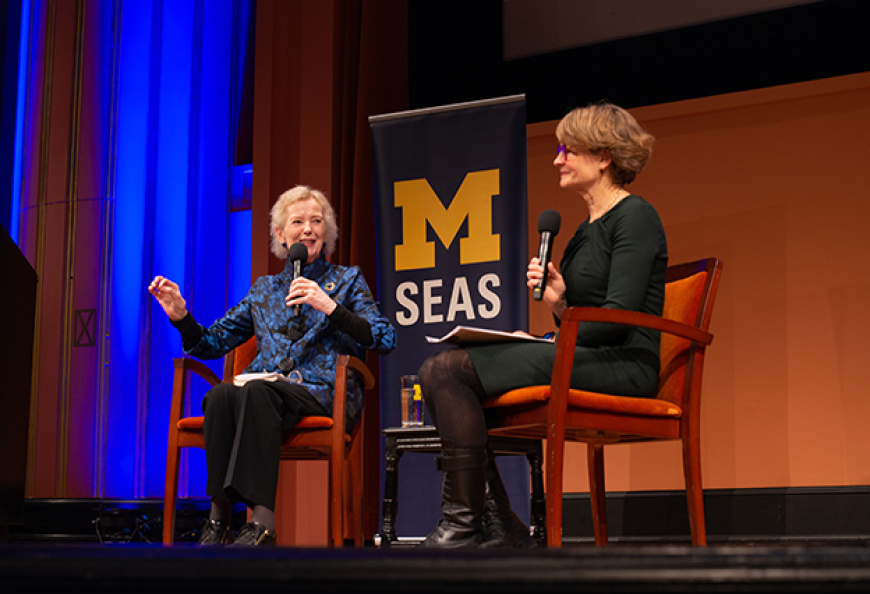
 back to all news
back to all news
Wege lecturer Robinson ties climate change to injustice

Addressing the world’s climate crisis requires a people-centered approach that elevates positive climate work and connects climate change with injustice, former Irish president Mary Robinson said March 13 during the Peter M. Wege Lecture on Sustainability.
“We are on the cusp of a clean-energy world, which we should all be immensely excited about and look forward to,” Robinson said. “Yet, we have this strange paradox where our world continues to warm 2.4 degrees above pre-industrial levels, and we don’t talk about it.
“We don’t share this sense that there is a climate and biodiversity crisis because we don’t read about it enough in the media and hear about it in our everyday lives.”
More than 1,000 participants attended the 21st Wege Lecture, the University of Michigan’s leading sustainability lecture series, at Rackham Auditorium. It was the first in-person Wege Lecture since the COVID-19 pandemic. Co-sponsored by the School for Environment and Sustainability and the Center for Sustainable Systems, the talk was moderated by Provost Laurie McCauley.
Earlier in the day, Robinson met with a small group of SEAS students for an hourlong Q&A session.
While visiting African countries as the United Nations high commissioner for human rights, Robinson said she became aware that the climate crisis affected poor countries and communities, small island states, and Indigenous peoples “much more severely and much earlier than the rest of the developed world,” even though these communities weren’t responsible for the emissions that were contributing to global warming.
With that came the realization that there are “various layers of injustice,” said Robinson, who now leads the Mary Robinson Foundation — Climate Justice, a center for thought leadership, education and advocacy for communities throughout the world that are disproportionately threatened by climate change.
Beyond racial injustice, which tends to affect people of color in the poorest communities in the world, Robinson cited gender injustice that affects women, and intergenerational injustice that affects young people who believe their future has been compromised by leaders failing to act against climate change.
Another injustice, which Robinson called a “subtle one,” focuses on the lack of support for developing countries in transitioning to clean-energy solutions. While developing countries are being told that using fossil fuels is not in their best interest, they aren’t being provided with the skills, training and knowledge to develop clean-energy alternatives, Robinson said.
She also cited the injustice to nature that has resulted in the “dramatic loss” of biodiversity and the extinction of animals.
“We spend $1.8 trillion a year on subsidies for what is destroying us, mainly fossil fuels,” she said. That money should be allocated toward clean energy and support for a just transition, said Robinson, who authored the book “Climate Justice: Hope, Resilience and the Fight for a Sustainable Future.”
Recognizing that we are in a “much more fractured world than ever before,” Robinson said one of the keys to moving forward in the climate movement is harnessing the collective power of women leaders, “whose trust is of remarkable value in our world at the moment because it exists at all levels.”
Robinson highlighted the newly launched Project Dandelion, a women-led coalition that was formed to solve the global climate crisis as quickly as possible. Dandelions are resilient, Robinson noted, “so we want to build an unstoppable movement that is optimistic and recognizes that we are on the cusp of a clean-energy world, and demands that we get that world.
“The next seven years until 2030 are probably the most important years in human history because we need to do the impossible and cut emissions by 45% to 50% globally and get on track for being net zero by 2050,” she concluded. “If we don’t, it will be so much more difficult—some scientists say virtually impossible—to do that.”
Watch the video of Robinson's lecture below.

